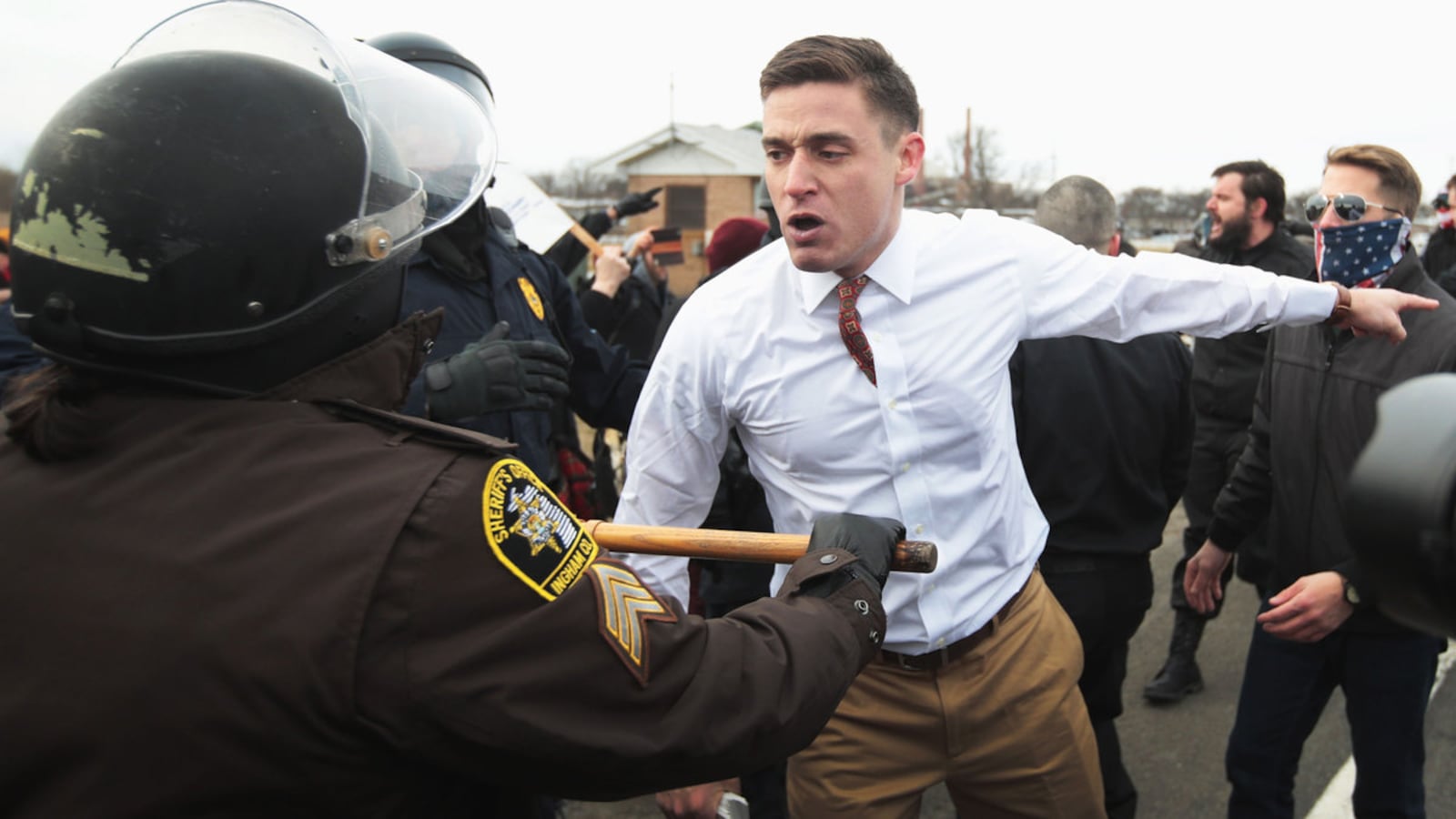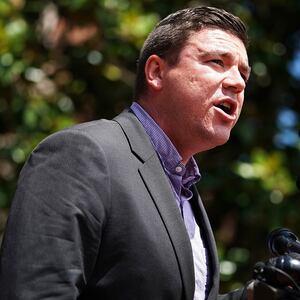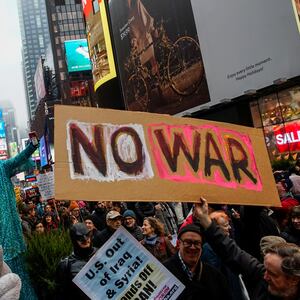They showed up to anti-war protests in Pittsburgh and Atlanta on Saturday waving signs and distributing flyers. They live-streamed from a Monday night anti-war demonstration in Austin.
But they weren’t associated with the left-wing crowd who organized pushback on the U.S. assassination of top Iranian general Qassem Soleimani last week. They were far-right activists, some of them affiliated with known extremist groups.
In the days after Soleimani’s assassination, leftist-organized rallies drew hundreds of attendees each—fewer than the tens of thousands who showed up to some of the most visible anti-war protests against the Iraq War, but sizeable pockets of discontent nonetheless. At the same time, some right-wing figures have also made their presence felt in the emerging anti-war scene. Some are hecklers, just looking to crash a rival protest. But others, including overt neo-Nazi groups and Republican pundits like Tucker Carlson, who has voiced opposition to war on Fox News, represent an anti-interventionist wing of an otherwise hawkish conservative movement.
The apparent ideological overlap has some lefties wondering what, if anything, they should do about the far-right figures at their rallies in the era of Unite the Right and "very fine people on both sides."
The first of the faceoffs appears to have come Saturday, when five far-right demonstrators reportedly showed up at an anti-war protest in Pittsburgh’s Schenley Plaza. Although they chanted along with anti-war slogans, the men carried anti-Semitic signs blaming Jews for wars. Leftist demonstrators drove the group away with a “Nazis out” chant.
One of the interlopers was later identified as Greg Conte, a white nationalist who has worked closely with racist organizations. Conte made national headlines in 2018 when it was revealed that he worked as a substitute teacher. (On Twitter, former students accused him of bigotry in the classroom. Conte previously told the Washington Post that he did not “openly preach” his views at school but sometimes questioned students on whether hate could be acceptable, or why diversity was good.)
The same day, at least one member of the white supremacist group Patriot Front distributed flyers at an anti-war protest in Atlanta, according to an activist involved in anti-fascist organizing in that city who spoke on condition of anonymity.
A fascist presence at an anti-war rally might strike some observers as surprising. But certain fringes of the right have historically cozied up with anti-imperial movements.
“People often confuse the far right with other conservatives,” Spencer Sunshine, a writer and lecturer long focused on the far right, told The Daily Beast. But unlike more mainstream Republicans, “the far right, traditionally, is very isolationist. The original America First committees were opposed to U.S. entry in WWII. Generally, these groups are opposed to U.S. intervention overseas. They’ll often say they’re proxy wars for Israel. You find this stuff a lot more among groups that are highly anti-Semitic, or are third-positionist.”
“Third position” describes fascist ideology that often fuses some left-wing economic and anti-war policy with overt white supremacy and opposition to immigration, feminism, and LGBTQ rights. The National Policy Institute, a racist thinktank where Conte used to work alongside white nationalist Richard Spencer, could be classified as third-positionist, Sunshine noted.
On Twitter, Spencer has voiced opposition to attacks on Iran, but framed his argument in terms of protecting “Aryan heritage sites” from “Zionist” forces. At least one subsequent tweet denouncing President Donald Trump around the time Iran struck military bases in Iraq on Tuesday was picked up by hosts of The View, where audience members applauded the white nationalist who recently made headlines for screaming racist and anti-Semitic slurs.
Actors on the far right often use wars to invoke anti-Semitic conspiracy theories, either overtly accusing American Jews of orchestrating them (as Conte’s crowd reportedly did in Pittsburgh) or speaking more euphemistically about Israel or “Zionists” fueling the war efforts.
“It’s been a long-standing tactic of the far right in the U.S. to try to recruit from left-wingers, or to create a coalition,” Sunshine said. Occasionally those efforts are successful. “There are some people on the left who want to have a left-right coalition of anti-war people… They want to have a bloc of all anti-imperialists and they don’t really care who it is.”
The far right’s favorite Fox News pundit, Tucker Carlson, also made anti-war gestures after Soleimani’s assassination, claiming that war with Iran would be a distraction from cracking down on immigration. Although the stance placed Carlson at odds with most of his network, his comments were in line with previous salvos against people of color, according to Matt Gertz, a senior fellow at the liberal organization Media Matters.
“The argument he’s making there is that it’s a bad idea to get involved in an escalating situation with Iran because it’s going to get attention off of what he calls the ‘invasion’ of the southern border,” Gertz told The Daily Beast.
“That language of invasion, like the language of ‘Great Replacement’ that he uses, are frequent tropes of white nationalists, and part of the reason that white nationalists really appreciate Tucker Carlson’s show and think he’s a big asset to their movement.”
When the missiles actually drop, some supposedly anti-war Republicans fall into pro-war party lines. This summer, Republican Rep. Matt Gaetz enjoyed bipartisan buzz for his work on an amendment to the National Defense Authorization Act that would have cut off federal funding for military actions on Iran that were not approved by Congress. The bill would have also barred the use of the 2001 or 2002 Authorizations for the Use of Military Force (AUMF) to justify attacks on Iran. (The White House’s best legal defense of the strike on Soleimani rests on a shaky combination of both AUMFs, Lawfare reported.) The bill passed in the House, but was dropped from the final text of the NDAA.
Despite his previous support of the bill, Gaetz was a vocal supporter of the strike on Soleimani.
“The President correctly *responded* to violence & ongoing threats against US personnel after repeated warnings and admirable restraint,” Gaetz tweeted. “He did *not* start a regime change war.”
The day after Soleimani’s assassination, left-wing Rep. Ro Khanna and Senator Bernie Sanders announced plans to reintroduce the bill. Gaetz’s name was notably absent from the press release.
“Gaetz’s staff and our staff are in touch for the Sanders/Khanna bill but no decision has been made yet on partnership,” a Khanna spokesperson told The Daily Beast on Monday. A Sanders spokesperson said the senator and presidential candidate was interested in working across the aisle to pass the bill. Gaetz's office did not respond to a request for comment prior to publication.
Already, questions about how to respond to far-right incursion are dogging leftist anti-war groups.
In Atlanta, an anti-fascist group has begun circling a flyer warning activists to “look out for facist entryism at antiwar protests.” The group advised protesters to photograph interlopers or confront them directly.
Although footage of Pittsburgh demonstrators expelling interlocutors went viral, some social media users alleged that a number of rally attendees did little to oppose Conte’s crowd. In Austin on Monday, two people said to be associated with the far-right group Texas Nomads SAR crashed a Democratic Socialists of America anti-war rally while live-streaming. Anti-fascists on Twitter accused the DSA of being too slow to respond to the disruption.
Madeline Detelich, a member of the Austin DSA leadership, said the two live-streamers were there to antagonize protesters, not co-opt the rally, and that DSA members tried blocking their cameras with anti-war signs. Nevertheless, her chapter will be “strategizing” for future clashes, she said.
“We’re thinking a lot about the best way forward. My own view is that numbers are our best friend.”
Sunshine also characterized the conflict as a numbers game.
“The really far-right people don’t have the numbers,” he said. “Their presence is just to be a parasite on the organization."








